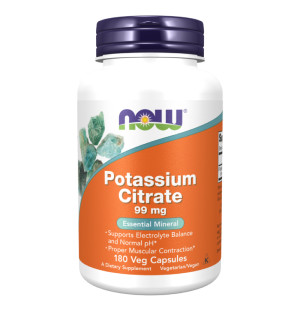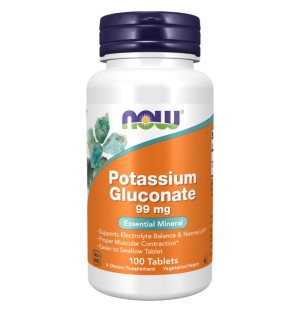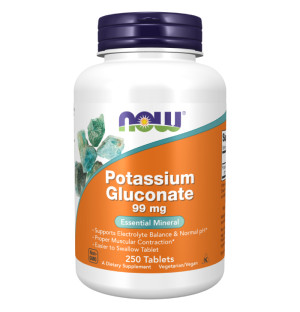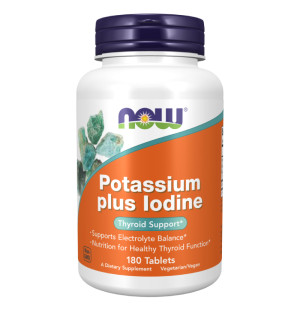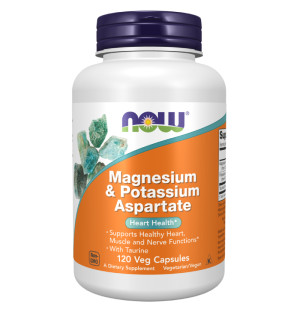Potassium
Potassium - a key mineral for electrolyte balance, heart function and muscle function
Potassium is one of the most important macronutrients that plays a key role in maintaining the health of the entire body. As an electrolyte, potassium helps regulate water and electrolyte balance, supports heart function, regulates blood pressure and ensures the proper functioning of muscles and the nervous system. The body is unable to store potassium, which means that it must be supplied regularly with food or supplements.
Potassium is primarily found inside cells, where it is responsible for maintaining the correct electrical voltage. This voltage is essential for the proper functioning of muscles and the conduction of nerve impulses. In combination with other electrolytes such as sodium and magnesium, potassium is essential for maintaining fluid balance in the body and optimal organ function.
Main benefits and functions of potassium
✅ Regulation of blood pressure
-
- Potassium plays a key role in regulating blood pressure, helping to neutralise the negative effects of excess sodium in the body. It acts as a natural counterbalance to sodium, helping to maintain healthy blood pressure levels. Adequate dietary potassium helps reduce the risk of high blood pressure and heart disease, such as stroke and heart attack. People with hypertension are often advised to increase their potassium intake to improve blood pressure control.
✅ Supporting cardiovascular health
-
- Potassium is essential for healthy heart function. It helps to regulate heart rhythm, which is particularly important for people with heart rhythm disorders (arrhythmia). Due to its ability to maintain electrolyte balance, potassium protects against sudden contractions of the heart muscle and promotes the normal contractility of the heart muscle. An adequate intake of potassium reduces the risk of cardiovascular diseases such as atherosclerosis.
✅ Support of muscle function and prevention of cramps
-
- Potassium is a key mineral for muscle health. It supports their proper contraction, preventing the painful muscle cramps that often occur with potassium deficiency. It is also essential for muscle regeneration after exercise. Physically active people, athletes and those at risk of excessive loss of potassium through sweat (e.g. as a result of intense exercise) can benefit from potassium supplementation to prevent cramps and improve physical performance.
✅ Water-electrolyte balance
-
- Potassium, along with sodium, plays a key role in maintaining fluid balance in the body. By regulating water levels in the cells, potassium helps prevent dehydration and supports proper kidney function. Adequate electrolyte balance is important for maintaining the health of internal organs, regulating blood pressure and preventing oedema.
✅ Nervous system support
-
- Potassium is essential for the proper conduction of nerve impulses. It helps to transmit signals between nerve and muscle cells, which is essential for coordination of movements, proper muscle function and rapid response to stimuli. Potassium deficiency can lead to coordination problems, muscle weakness and neurological problems such as tingling and numbness in the limbs.
✅ Support of metabolic processes
-
- Potassium supports the body's metabolic functions, including carbohydrate and protein metabolism. It is also key in maintaining the body's acid-base balance, which supports cell health and prevents over-acidification.
✅ Protection against osteoporosis
-
- Potassium supports bone health by helping to regulate calcium metabolism and reducing the loss of this mineral from bones. Adequate levels of potassium in the diet can help improve bone mineral density and reduce the risk of osteoporosis, especially in older people and postmenopausal women.
Types of potassium in supplements
🟧 Potassium citrate
-
- Potassium citrate is one of the most commonly used forms of potassium in dietary supplements. It is well absorbed and is often used in the treatment of kidney stones and to support acid-base balance. Potassium citrate is also gentle on the digestive system, making it suitable for use by people with sensitive stomachs.
🟧 Potassium gluconate
-
- Potassium gluconate is a mild and well-tolerated form of potassium that is used in supplements to support heart function and muscle function. It is often chosen for its good bioavailability and gentle effect on the digestive system.
🟧 Potassium chloride
-
- Potassium chloride is one of the simplest forms of potassium available in supplements. It is commonly used to treat potassium deficiencies, especially in people with electrolyte disorders. However, this form of potassium can be slightly more irritating to the digestive system compared to other forms.
🟧 Potassium aspartate
-
- Potassium aspartate is a form of potassium that is well absorbed and often used in supplements for athletes and physically active people. It supports muscle regeneration, prevents cramps and improves physical performance.
Symptoms of potassium deficiency
- Muscle weakness and cramps: Potassium deficiency can lead to painful muscle cramps, muscle weakness and feelings of fatigue, especially during physical activity.
- Heart rhythm disturbances: Potassium is essential for regulating the heart and a deficiency can lead to arrhythmias, palpitations and serious cardiovascular problems.
- Dizziness and weakness: Potassium deficiency can affect blood pressure, leading to dizziness, feelings of weakness and fainting.
- Digestive problems: Potassium supports the functions of the digestive system and a deficiency can lead to constipation and impaired intestinal peristalsis.
- Coordination and nervous system problems: Potassium deficiency can lead to neurological problems such as tingling, numbness and difficulties with coordination of movements.
Who should consider potassium supplementation?
❎ People with hypertension: Potassium is crucial for regulating blood pressure, and supplementation may help those struggling with hypertension to improve cardiovascular health.
❎ Physically active people and athletes: Intense exercise leads to a loss of potassium through sweat, which can increase the risk of deficiency. Potassium supplementation helps prevent muscle cramps and improves recovery.
❎ People on a low-sodium diet: Potassium supplementation can be helpful for people on a low-sodium diet who need to maintain an adequate electrolyte balance.
❎ Older people: Older people are more prone to cardiovascular and muscular problems, so potassium supplementation may support their health.
❎ People with electrolyte imbalances: People with electrolyte imbalances, such as hypokalaemia, may need potassium supplementation to correct deficiencies and improve overall body balance.
Summary
Potassium is a key mineral for the proper functioning of the heart, muscles and nervous system. Its regular supplementation supports electrolyte balance, regulates blood pressure, prevents muscle cramps and supports heart health. Potassium is particularly important for physically active people, athletes, people with hypertension and those at increased risk of potassium deficiency. The variety of forms of potassium available in supplements allows the product to be tailored to individual health needs, supporting the body's overall health and vitality.

